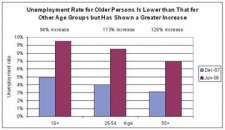
Courtesy U. S. Bureau of Labor Statistics
To get a better picture of the employment landscape for workers 50 and older. PRIME contacted Bob Skladany, vice president of research for the Waltham, Mass.-based Web site,
www.RetirementJobs.com.
He had some sobering words for middle aged and older workers.
First off he said, given the recent shift in the economy, boomers have to accept that they're going to need to stay in the workforce a lot longer than they thought.
"The idea of [early retirement] is only 35 to 40 years old .you work for 30 to 40 years, retire at 62 or 63 and stop working," Skladany told PRIME. "That's no longer a realistic model because retiree health programs which used to be widespread are gone; retiree pension plans are effectively gone; [and] we are living longer and outliving our savings.
"All the factors are pointing to the fact that, except for the very wealthy, people will have to work full or part time for five to 10 years longer than they did in the past."
And if you're among the seven percent of workers who've recently been downsized or laid off, the road to reemployment may be a bit rougher than it was just a few years ago.
"A lot of older jobseekers don't want to hear this," Skladany said. "But if you're over 55 and you become unemployed, your job search will take longer by about a month or two [than a younger person] and the pay will be 25 to 50 percent lower than before."
Right now, the average salary offered to jobseekers in this age category is about $25,000 a year, he said.
"It's going to take more time, you're going to make less money and it's going to be darn frustrating," he added.
Is it age discrimination?
According to the United States Department of Labor Web site, the Age Discrimination in Employment Act of 1967 "protects certain applicants and employees 40 years of age and older from discrimination on the basis of age in hiring, promotion, discharge, compensation, or terms, conditions or privileges of employment."
But that doesn't necessarily mean that older workers who've been downsized or laid off were victims of age discrimination under the law.
"Employers do tend to focus on the salaries [ of employees] when looking to lay off," Skladany said. "It's not illegal to lay off the older workers [in a company] if it is based on salary."
Skladany said that the former interpretation of this type of action laying off the higher salaried workers, who usually were also the older members of the company was seen as de facto age discrimination.
"But the Supreme Court [recently] said that it's OK, if the company is doing it for economic reasons," he said.
"At a time when the older workforce is growing as a proportion of the [general] workforce, the enforcement provisions available for age discrimination [are] being weakened," he added.
And he said, with so many older workers staying in or rejoining the workforce, the question of what is and isn't age discrimination is going to be a "hot potato issue."
And it isn't just economic realities that are contributing to the problem of age bias both real and perceived.
"Most people think that older workers are less innovative and less creative," he said.
Skladany said the notion of taking Social Security at 62 the so-called early retirement op-out has actually contributed to this cultural notion of older workers being less viable.
"If you can retire at 62, 62 must be old," he said.
And older workers themselves contribute sometimes unwittingly to this perception.
Skladany said many of the questions that come to him through the employment-related column he writes for AARP.org, hinge on the question of age discrimination in the workplace.
"Every week I get 30 to 50 questions .I'm [applying for a job, being passed over for promotion, laid off at the end of the month] and I know I'm being mistreated because of my age," he said.
And though in some instances age discrimination may be a factor, Skladany said it's often "older workers [who] have a lot of trouble moving past the preconceptions that they are going to be mistreated and give [a job or interview] their best shot."
